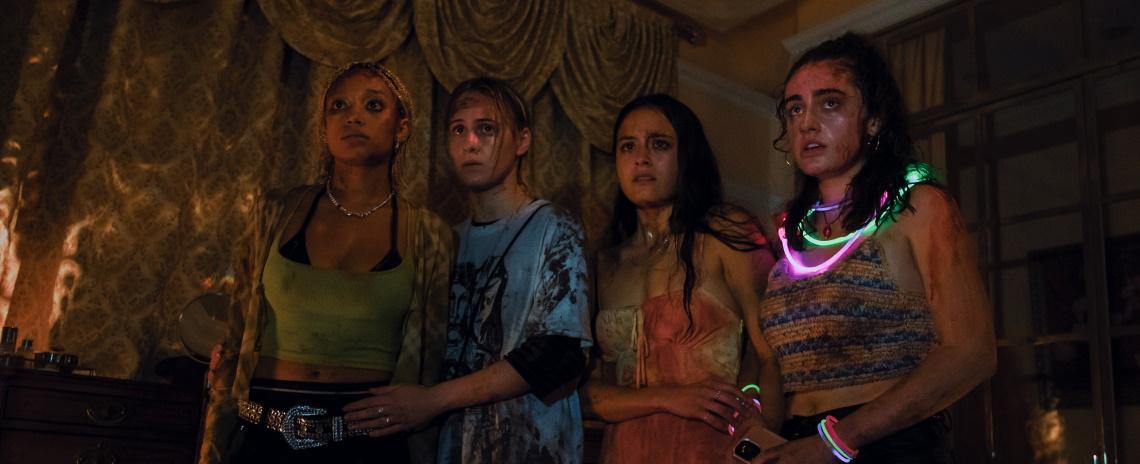Bodies Bodies Bodies is the heir apparent to Wes Craven’s Scream – a witty whodunit that upends slasher convention to toy with the audience’s perception of genre. There’s a dangerous cleverness to the work, and as the body count grows higher and the tension reaches a fever pitch, the line between its value as a horror satire threatens to get lost in the expanding chaos.
It begins with an almost cloyingly simple premise. Sophie (Amandla Sternberg) brings her new girlfriend Bee (Maria Bakalova) to a party with her closest friends. The casual effervescence of this group threatens to crumble before the first body hits the floor, however. Sophie’s arrival is unexpected at best, and Bee’s presence as an unknown within the group results in more than one awkward conversation, kicking off a cavalcade of party fouls. There’s an exacting level of detail in director Helina Reijn’s handling of the script, with the isolated setting providing a role for almost every narrative prop as the group begins to unravel.
One could easily accuse this approach to plotting as excessively mechanical, with Chekov’s (sometimes quite literal) gun being indicated so conspicuously that narrative immersion is sacrificed in the service of a narrative jigsaw. A window that refuses to fully close, a machete that feels wholly out of place, a car light that the camera lingers on for just too long – the script’s spareness encourages the audience to play a game with its story, but the insistence on operating as a never-ending series of setups and payoffs makes the artifice almost too much to bear.
The film, written by Sarah DeLappe and Kristen Roupenian, thrives when it is hurtling at full momentum. Such is the case when the titular party game kicks off, just as the heavy storm outside reaches a fever pitch. The uneasiness within this group of people – keenly aware of the harm they’ve caused each other, and yet incapable of letting bygones be bygones – soon escalates into painfully awkward shouting matches. The appearance of a dead body almost comes as a relief, if only because it draws the cast away from each other’s throats for the moment. Yet it is clear that the horror of the film is secondary to the hellish idea of having to occupy the same room as this faux-friend group, where the past traumas of their shared history are hurled like acid-dipped knives. It is here that the dramatic ambitions of the narrative take the reins, the uneven work of establishing this slasher-sleepaway scenario paying off with the brazen confidence of its execution.
The self-assurance in the storytelling is especially commendable given how deeply complex these characters turn out to be. The film constantly toes the line between a “satire” of Gen-Zisms – comprising many of the moments that define an ultimately misleading set of trailers – and a genuinely introspective assessment of how these characters would cope when confronted with a rampaging killer. The standout sequence in a film composed of many worthy candidates is a late-movie argument that sustains itself for almost 10 minutes, almost always in closeup, probing the faces of a uniformly excellent leading cast as it oscillates between ridicule and empathy. Each punchline opens the door for another layer of past trauma to slip into the conversation, escalating as the narrative as the immediacy of their repressed guilt surges to the surface. It is in these knock-down, drag-out shouting matches that the film becomes something more than the sum of its parts – hysterical and in hysterics as the shadow of death looms over everyone.
This is Bodies Bodies Bodies’ innovation in its genre, beyond what is achieved through its twists. The focus almost solely on the experiential tension and paranoia of its scenario makes it unique as a slasher, although its brilliantly funny final moments threaten to undo the hard-earned sense of honesty that the preceding 90 minutes established. This is especially true of how the film probes Sophie and Bee’s relationship, the film’s central dramatic thread. The story’s success in vulnerably and casually depicting a queer relationship is one of its greatest strengths, and doubly so when considering the two leads are two of the least defined personalities in the cast.
That the resolution to their subplot and the denouement of the larger narrative are one and the same is frustrating when both reach the same pointless end. Perhaps it’s admirable that the film doesn’t pander to audience expectations. However, the empty feeling is a bit too sour when the potential to dive further into such complex character dynamics is left on the table. It still manages to straddle the line between meta-playful genre tweaking and the serious consequences of the horror at hand - but only barely. When the story concludes on a note of gamesmanship, the hollowness inherent in the film’s construction lingers more than one would hope.
Despite these shortcomings, the bulk of Bodies Bodies Bodies is still genuinely remarkable. The dynamics of its premise and cast are wonderfully explored, and the sense of awkward paranoia that punctuates the explosive arguments are more than worth the price of admission. Jasper Wolf’s icy, refracted lensing brings out the beauty of a night spent in mortal terror, and the stacatto-electronics of Rich Vreeland’s score are playfully tense and perfectly implemented. Whether the film manages to land its tonal balance between drama and satire is ultimately up to the viewer. However, for a work of horror that seems to engage with genre mostly by superficially inverting common tropes, it still manages to eke out its place as a wholly unique brand of terror. It slays in all the best ways – and its fouls are more than forgivable when the vibes are nailed so perfectly.
Rating: B
Bodies Bodies Bodies is now playing in theaters.


